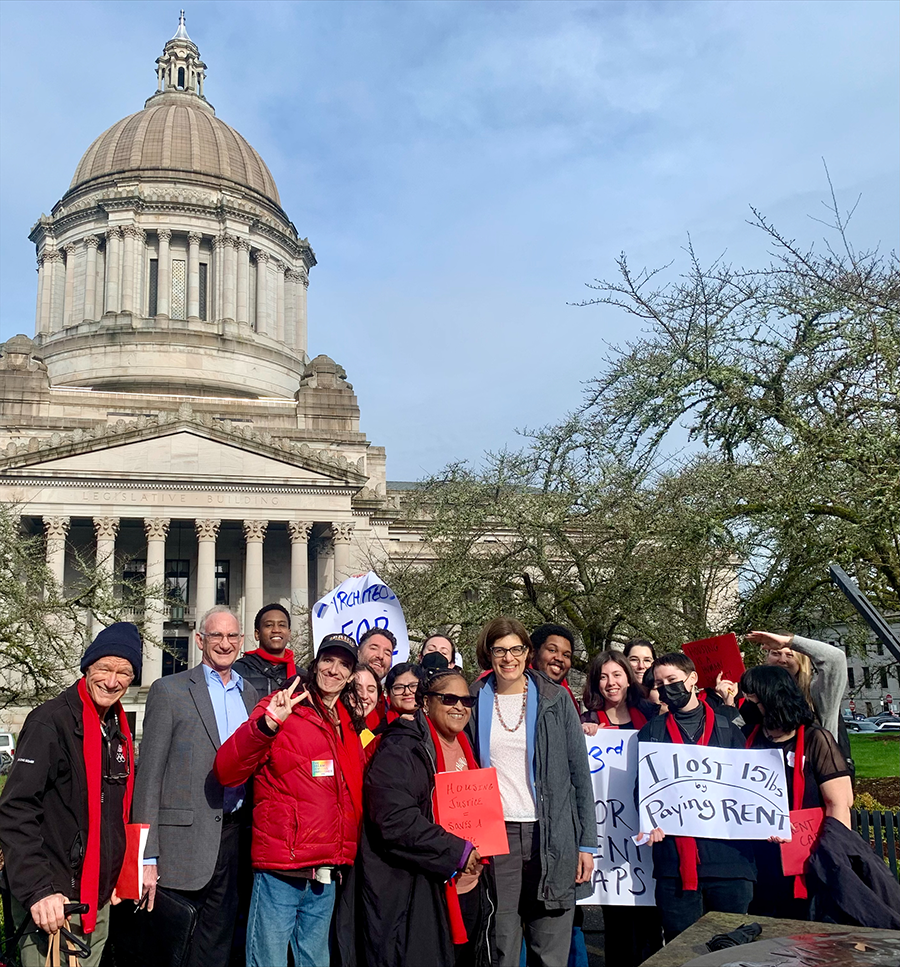With the end of this year’s 60-day legislative session, I want to share a few policy successes and areas I continue to work on. In an upcoming email, I will provide budget updates I helped negotiate in our operating budget, as well as construction projects funded in the capital and transportation budgets.
I am so grateful to the many neighbors who reached out during the legislative session to share their priorities and provide feedback. Please reach out to me at Nicole.Macri@leg.wa.gov with your thoughts on the work we have done and what I can focus on ahead of next year.
What Passed This Year
From addressing climate change and gun violence to stopping attacks on LGBTQ+ people, this has been a productive session.
Addressing climate change
HB 1589: Transitioning to a clean, affordable, and reliable energy future. As more people switch to electric heat pumps in their homes, our natural gas supplier, Puget Sound Energy, is projected to lose customers. As PSE maintains and repairs equipment and facilities for a dwindling natural gas customer base, prices for those remaining will go up. HB 1589 requires PSE do comprehensive decarbonization planning across both their gas and electric lines of business and allows them to pay for new equipment and facilities sooner, when their customer base is still large enough to fairly distribute the costs. The bill requires that PSE prioritize future revenues to help low-income households first and invest in electrification programs for everyone second. The bill does not prohibit new gas hookups, nor does it stop current gas service.
HB 1368: Funding zero-emission school buses. Diesel school buses contribute to lung disease and conditions like asthma, are bad for the environment and disproportionately impact overburdened communities. HB 1368 provides grants for school districts in overburdened communities to purchase zero-emission school buses. The grants prioritize districts that use buses manufactured prior to 2007 and serve communities highly impacted by air pollution identified under the Climate Commitment Act.
Protecting LGBTQ+ communities
SB 6105: Creating a strippers’ bill of rights and ending discriminatory actions against LGBTQ+ venues. When the Liquor & Cannabis Board raided our historic LGBTQ bars in January, it highlighted how existing policies can still be weaponized against marginalized communities. The “lewd conduct” rule has been used to harass the queer community and disempower adult entertainment workers. SB 6105 overturns this rule and ends the ban on liquor licenses for strip clubs, which dancers asked for in order to diversify club revenue and stop their financial exploitation. It also strengthens workers’ rights by mandating on-site security, panic buttons, and training on harassment prevention and conflict resolution. In addition, the bill establishes equitable charges and fair pay for adult entertainers. These measures enhance protections for vulnerable workers, fostering a safer and fairer working environment.
HB 2331 and SB 5462: Prohibiting book bans and ensuring inclusive curricula in our schools. Attacks on the LGBTQ+ community are rapidly increasing across the country. Several states have attempted to restrict schools or libraries from offering books written by LGBTQ+ authors or that discuss LGBTQ+ themes. By contrast, we passed two bills to end book bans and ensure inclusive curricula in our schools. HB 2331 ensures that an individual person can’t object to a book to get it banned. Instead, there will be a process that allows parents to give feedback on books and a local instructional materials committee can review that feedback. This will result in a more fair and inclusive process that balances concerns from parents with access to diverse books that provide cultural enrichment. SB 5462 takes us a step further by requiring school districts to provide age-appropriate and inclusive curriculum that honors LGBTQ+ people in our state.
More affordable health care
SB 5213: Transparency and accountability for pharmacy benefit managers. Pharmacy Benefit Managers, or PBMs, play the role of middleman between pharmaceutical companies and pharmacists. While there is a role for PBMs in the process, the lack of transparency and increased cost to consumers is concerning. SB 5213 provides some much-needed accountability and transparency, requiring the same fees regardless of which pharmacy someone uses and bars PBMs from blocking pharmacies that are new or recently transferred locations. The bill also bars PBMs from coercing people into using specific pharmacies or charging more when not paying with cash. It provides greater consumer protections and restrictions on how PBMs can interact with consumers, pharmacies, and pharmaceutical companies.
HB 1508: Increasing consumer affordability through the Health Care Cost Transparency Board. The Health Care Cost Transparency Board (HCCTB) was established in 2020 to analyze health care expenditures in our state, identify trends in cost growth, and set a growth benchmark as a target for health system providers and payers (aka health insurers) to not exceed. Currently, the board doesn’t have the teeth needed to reach those goals in a meaningful way. I introduced HB 1508 to give the board more authority and tools to meet their goals and help center consumers in our effort to understand the rising cost of health care in Washington state. It requires the board to study underinsurance and insurance trends among employees and employers, and publicly identify the payers or health care providers who exceed the cost growth benchmark. The bill also adds more members to the board to include individuals representing the interest of consumers, labor purchasers, and employer purchasers.
Gun safety
We built on past work to address the public health crisis of gun violence in our state with the passage of a number of bills, including HB 1903 to require gun owners to report stolen guns to law enforcement within 24 hours or face a potential fine; HB 2118 to ensure gun dealers secure their inventory, carry insurance and make timely reports of loss and theft; SB 5444 to ban open carry of guns in public libraries, zoos, aquariums, and transit stations; and HB 2021 to authorize State Patrol to destroy firearms they have seized and require local police to destroy firearms acquired through buyback programs.
We Still Have Work To Do
While we made important strides in several areas, there remains work on a number of key policies, including the ones below.
Housing stability and supply
HB 2114: Increasing market fairness by stabilizing rents. This bill would have capped rent increases at 7 percent annually in most properties older than 10 years. This was a tough bill to see fail, because of how many people would have benefited, particularly in our district, which has the highest number of renters in the state. It was a top priority in the House, where Democrats pushed it through and sent it over to the Senate. The Senate had two chances to pass rent stabilization but failed to pass it out of committee both times. You can read my thoughts on this failure in a statement I sent out to the media the day the bill died. Several of the senators who opposed rent stabilization will not be in the Senate next year, so I hope with a new group of leaders we can see this bill become law.
HB 2160: Increasing housing supply near transit infrastructure. This “transit oriented development” bill would have prohibited cities from using their plans to reduce or slow down affordable housing construction near transit stations. It also would have required at least 10 percent of housing in new developments near transit to be affordable housing for the next 50 years. We’re going to need to build more housing, and if trends continue, we’ll need even more affordable housing than cities are building now.
HB 2276: Affordable Homes Act. This bill would have provided home sellers some tax relief and increased funding for affordable housing construction and other housing programs. It would have increased funding for our Housing Trust Fund, the Apple Health and Homes Account, and the Developmental Disabilities Housing Account. It does so by reforming our Real Estate Excise Tax rate, which would cut the tax rate for sellers whose homes are under $750,000 and would impose a new rate of 1 percent on the sale of homes over $3.025 million. Although this bill has broad support from constituents, this was opposed by developers, landlord associations, realtors, and commercial real estate lobbyists – and did not move forward in the House.
Access to essential health care:
SB 5241: Keep Our Care Act. This bill would have provided greater authority to the attorney general to review hospital systems when they want to merge, with a focus on maintaining access to reproductive, gender-affirming and end-of-life care. We are seeing more and more large systems gobbling up smaller providers and then scaling back health care access. When care is cut, it usually means lower costs and more profit for the hospitals but that doesn’t usually translate into lower prices for consumers, so it’s a lose-lose for all of us. I fully expect this bill to come back next year.

Educating youth about genocide
HB 2037: Requiring all K-12 students receive education on the Holocaust and other genocides. Fundamentally, this bill was about teaching K-12 students about the Holocaust and other genocides. The bill failed – not because of opposition to the idea of educating children about genocide, but because of the politics of the current war in the Middle East. The House Democratic Caucus has made it a priority to support marginalized people against discrimination, injustice, and systemic inequity. Jewish and Palestinian people face these challenges in different contexts. This nuance becomes lost in large groups and we heard from some that those supporting the bill were pro-Israel and those wishing to alter the bill to make it clearer and more inclusive were terrorists. Some of my legislative colleagues even received death threats. Right-wing media went as far as to portray the House version of the bill as “pro-Hamas”, leaving a mess in its wake unrelated to the actual policy content. I am grateful that we have a thorough democratic process that allows us to reexamine bills and their intent as we hear from community members. I am confident that we can do better in the future.



